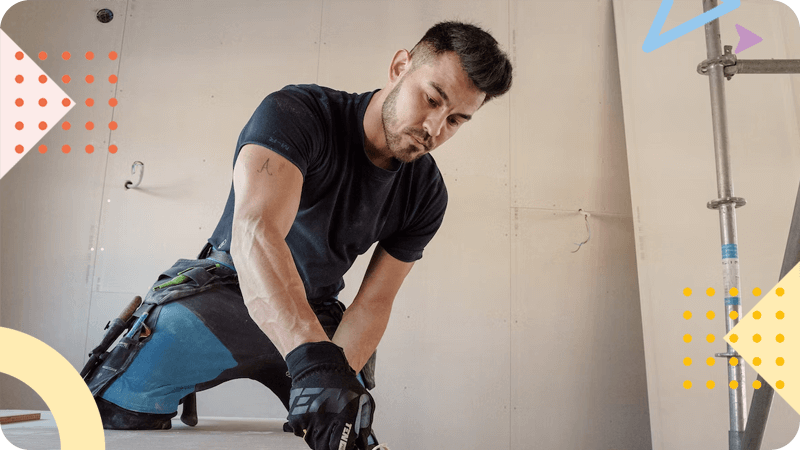Intellectual Property Rights For Small Businesses

Do you know your intellectual property rights?
Understanding the different kinds of intellectual property is the first step in ensuring continued success for your small business. Whether it’s patented, design rights, copyrights, or trademarks, when it comes to your small business’s success story, safeguarding and protection are a must.
By recognising intellectual property law and implementing it throughout your business you can improve your position not only in your industry but with possible expansion plans in the future.
Protecting your intellectual property when starting a business is key, that’s why we’ve collected everything you need to know about IP rights and how you can apply them.
What Is Intellectual Property (IP)
Intellectual property (IP) can seem daunting and complex, but it doesn’t have to be.
In the simplest terms, intellectual property is the ownership of a design or idea by the person it originates from. This means you obtain exclusive rights to a creative design or concept that cannot be copied or reused without your permission.
Why Should Small Businesses Protect Their IP?
When protecting ideas, businesses, and individuals, it’s important to recognise the positives of properly defending your position in your industry. This means you can reap the benefits of your ideas and inventions.
Here’s why you should protect your IPs:
It doesn’t just serve you and your small business but increases the appeal for future investments and collaborations
Critical for fostering innovation
Spend less time concerned with competition and focus more on research and development
Drastically boost the protection of your business
Effectively defend your position in your industry against disputes or unfair competition
Increase the appeal of your small business, showing advancements in your industry
Enhance your market value
Protect ideas that are profit-making assets
What Falls Under Intellectual Property?
Intellectual property isn’t one narrow road but refers to many diverse creations of the mind. The many aspects of intellectual property mean it’s essential that you protect your small business from the types of IP that apply to your product or service.
Trademarks
What Is A Trademark?
This type of intellectual property means anything that is a recognisable sign, design, or expression distinguishing it from others, can be trademarked. Whether it’s a word, phrase, symbol, or design that identifies your products or services, it can be legally trademarked and owned by you.
A trademark owner can be an individual, company, or any legal entity. Common examples are Nike’s swoosh or McDonald’s golden arches, capable of clearly differentiating them from other enterprises.
How Do I Register For A Trademark?
Applying to register a trademark is a straightforward process with standard online applications starting at £170. The registration process usually takes 4 months if no one opposes it. When applying, know the trademark classes you want to register in. This simply groups together similar products or services into 45 different classes.
The good news is that registered trademarks last for 10 years so you won’t have to reapply anytime soon. Register for a UK trademark here.
Patents
What Is A Patent?
Do you have an original invention you want to share with consumers? Firstly, ensure you have a patent in place.
A patent is an exclusive right for an invention for a product or service that innovated the way of doing something. This can relate to anything from a new technical solution or problem. A patent is a public record with technical information concerning the invention within your patent application.
The main purpose of a patent is to protect inventors’ rights, ensuring their creations exclude others from making, using, or selling without permission. A patent typically costs £4,000, however, the commercial benefits for your small business, from licences or the sale of your patent, can dramatically outweigh the initial fee.
How Do I Apply For A Patent?
Before you start your application, always research similar patents to ensure your invention is new. This will save you a lot of time and hassle in the application process because the whole process can take up to 5 years to complete.
Once you have prepared your patent application and drafted the patent specification, you must get your search report and wait for your application to be published. The process is completed by substantive examination which determines if your creation is inventive enough. Always remember that you must renew your patent.
Apply for a UK patent here.
Design Rights
What Are Design Rights?
Correctly protecting the appearance of your product from its lines, contours, shape, and colour ensures exclusive rights for the registered design. This means you have the legal right to stop an unauthorised company or business from producing or using your design.
A registered design solely protects the physical look of a design, not how it functions or works.
What Is The Difference Between Registered And Unregistered Designs?
Just like the name suggests, registered designs are registered at an intellectual property office to ensure they’re appropriately protected. Registered designs offer 25 years of protection in the UK, providing you with additional cover and copyright protection.
Whereas unregistered designs defend the shape, construction, and design of your product but last up to ten years. Unregistered design rights are automatic to prevent unauthorised copying.
Can your design be registered? These products can’t be registered as a design:
Books
Calendars
Leaflets
Forms and other documents
Dressmaking patterns

How Do I Register For A Design Right?
Registering for design rights must meet these criteria before applying:
Innovative and new
Proof of when the design was created
Not be offensive
Not include protected emblems or flags
Registering online is cheaper by post with fees starting at £50. The Intellectual Property Office examines your application within 4 weeks, with immediate registration if they find no objections. Register a UK design right here.
Copyright
What Is Copyright?
Copyright is the exclusive and assignable legal right to print, publish, and perform the artistic expression of a creator of original work.
Copyrighting your work automatically gives you the exclusive right to copy, sell, or distribute your work, safeguarding you from copyright infringement. This means that the legal right of the owner of this intellectual property must give authorisation for work to be copied or reproduced. The main purpose is to safeguard your artistic intellectual property.
Unlike other forms of intellectual property, there is no need to apply or pay a fee as the protection automatically occurs.
How Do I Protect My Copyright?
Protecting your original works starts by clearly outlining that your work is copyrighted to prevent people from infringing on it. Protecting your work is your responsibility however, you can seek guidance and help from an intellectual property professional if you feel you may have a dispute.
Use the copyright symbol, your name and the year your work is created.
How Long Does Copyright Last?
Automatic! Once you create your work, copyright protection is immediately in place. The length of copyright protection depends on your industry and the type of work you create. This ranges from 70 years after the author’s death in written artistic work or 50 years for broadcasts.

How Does Intellectual Property Affect Small Businesses?
IP protection not only builds value for your small business but can aid in its growth and longevity. It can act as a metaphorical shield and sword for your small business in the event of legal disputes or infringements.
Here’s how intellectual property can affect your small business:
Protects your core business model enhancing research and innovation
Drives development activities
Ensures economic prosperity
Protects your assets
Prevents competitors copying your inventions and ideas
Solidifies legal security
Discourages competition
Reinforces your market value
Improves the image of your small business
Diversifies your revenue stream
What Is Intellectual Property Theft?
As a small business owner, it’s important to understand what exactly intellectual property theft is. This is the term given to an individual or business that steals a creative expression, idea, or invention from an existing business.
Whether this is patents, copyrights, or trademarks, the robbing of these ideas and designs can result in legal action. If you think an individual has stolen intellectual property, you can report the theft and handle the dispute or case in civil court.
How might this affect your small business? The impact of intellectual property theft can result in a loss of competitive advantage, reputation damage, reduced business growth and loss of customer trust.
Intellectual property rights are crucial for you as a small business to continue turning ideas into commercially successful products or services. Learn more about how to propel and grow your small business on the My New Venture learning platform.


